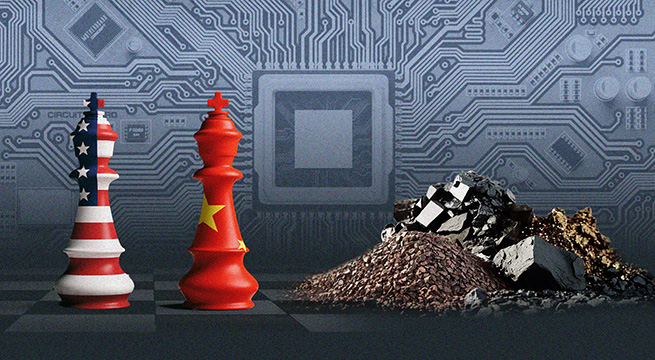 Pic.: trendsresearch
Pic.: trendsresearch
China produces the entire world’s supply of samarium, a rare earth metal that the United States and its allies need to rebuild inventories of fighter jets, missiles and other hardware. Without these magnets, the United States and its allies in Europe will struggle to refill recently depleted inventories of military hardware, ‘The New York Times’ notes.
For more than a decade, the United States has failed to develop an alternative to China’s supply of a specific kind of rare earth crucial for the manufacture of magnets for missiles, fighter jets, smart bombs and a lot of other military gear.
Rare earth minerals are a central issue in the trade talks between the United States and China now underway in London.
China produces the entire world’s supply of samarium, a particularly obscure rare earth metal used almost entirely in military applications. Samarium magnets can withstand temperatures hot enough to melt lead without losing their magnetic force. They are essential for withstanding the heat of fast-moving electric motors in cramped spaces like the nose cones of missiles.
On April 4, China halted exports of seven kinds of rare earth metals, as well as magnets made from them. China controls most of the world’s supply of these metals and magnets. China’s Ministry of Commerce declared that these materials had both civilian and military uses, and any further exports would be allowed only with specially issued licenses. The move, according to the ministry, would “safeguard national security” and “fulfill international obligations such as nonproliferation.”
The ministry has begun issuing some licenses for magnets that include two of the restricted rare earths, dysprosium and terbium, to automakers in Europe and the United States. Magnets with these two rare earths, which are used in brake and steering systems, can withstand the heat of a nearby gasoline engine but cannot reliably tolerate the greater heat encountered in military applications. But there has been no sign that China has approved exports of samarium, which has few civilian applications.
Chinese and American officials began on Monday two days of trade talks in London. Restoring the flow of rare earths is a priority for U.S. officials, but few expect China to rescind its new export license system entirely.
The interruption in samarium supplies over the past two months comes as the United States and its allies in Europe are rushing to rebuild inventories of advanced weaponry. These stocks have been severely depleted by shipments to Ukraine after the Russian invasion and, for the United States, to Israel during the Gaza conflict.
The Trump administration is also trying to supply more weapons to Taiwan, an island democracy over which Beijing claims sovereignty. In addition to halting exports of rare earths for military use, China recently imposed sanctions on some American military contractors because of their roles supplying Taiwan.
Those sanctions now bar Chinese companies and individuals from having any financial connection to the U.S. military contractors. That did not have much of an effect on the samarium industry until recently, because China exported samarium to chemical companies that mixed the metal with cobalt before selling it to magnet manufacturers, which then sell to the military contractors.
But Beijing’s new export controls on rare earths specify that licenses can be issued based only on the final user of the mineral at the end of the supply chain. For samarium licenses, that sometimes means military contractors.
Of the seven kinds of rare earth metals restricted by China, the demand for six of them is largely civilian, said Stanley Trout, a metallurgist at the Metropolitan State University of Denver who has specialized in samarium magnets since the 1970s. Samarium is different. It is “almost exclusively used for military purposes,” he said.
read more in our Telegram-channel https://t.me/The_International_Affairs

 13:44 04.08.2025 •
13:44 04.08.2025 •






















